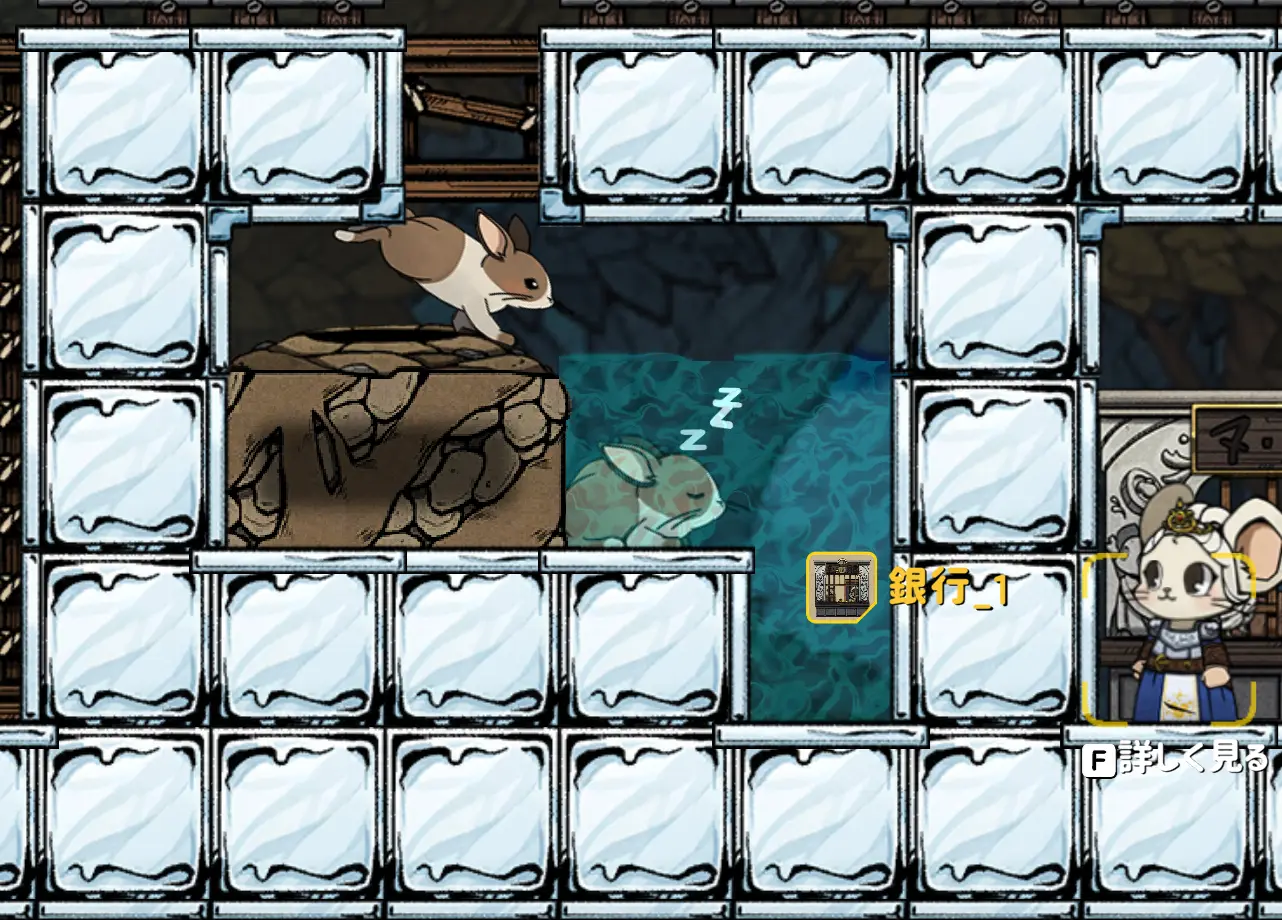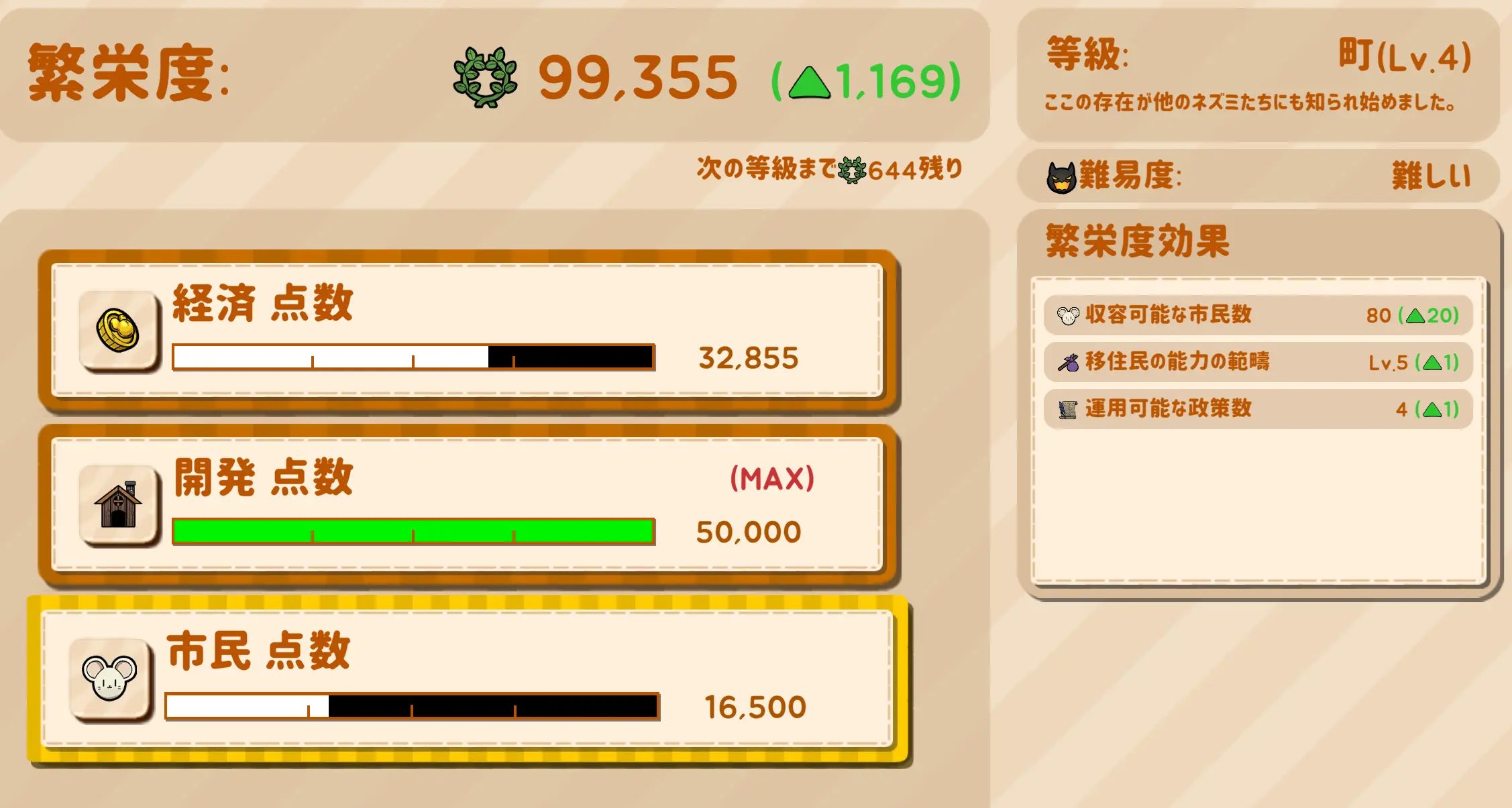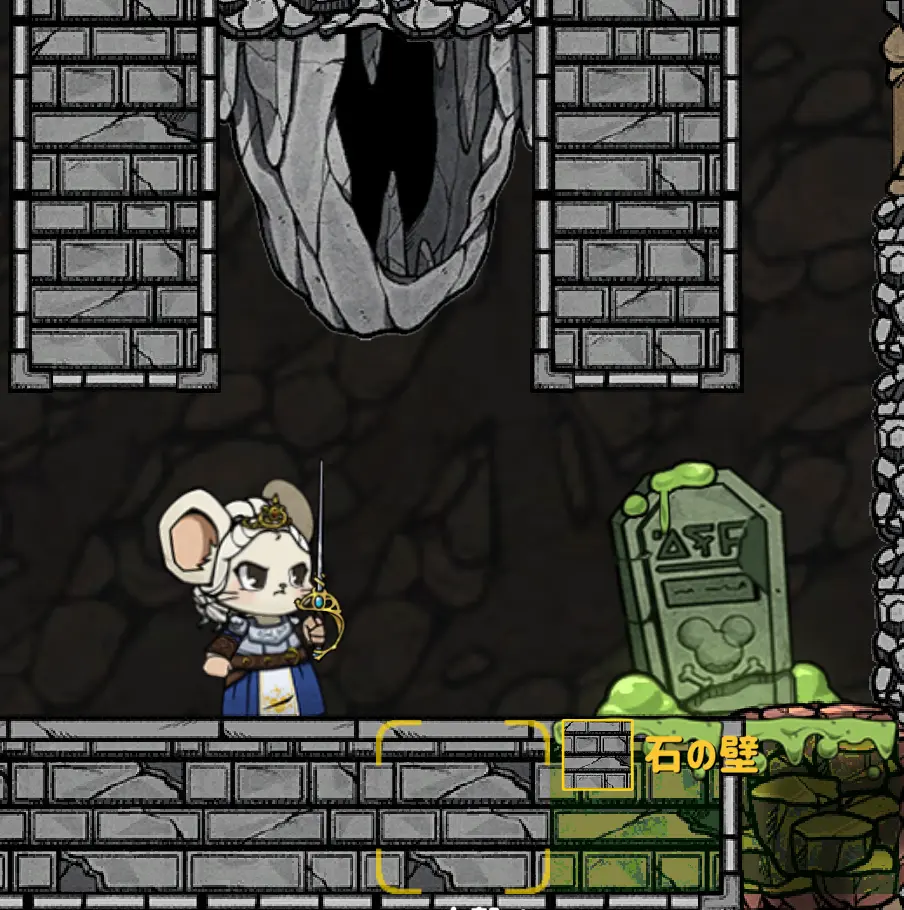What kind of path should you follow in this world with strategic survival and sandbox and city building content? What should you pay attention to? Here you will learn all the details in this Ratopia Walkthrough guide.
Ratopia Walkthrough Guide 100%
In this Ratopia Walkthrough 100% guide we will show you notes summarizing discoveries after challenging ratopia from the first encounter to high difficulty for over 600 days of play
Auto Rabbit Hunting Room

Currently, rabbits, like rats, cannot breathe underwater. Since they tend to move to places other than their burrows, flooding areas other than burrows will cause them to drown willingly. This method allows you to obtain one rabbit per day. With a slaughterhouse, you can get five pieces of meat from one rabbit, allowing you to overcome hunger without requiring manpower throughout the seasons.
Rabbit farms can be used solely for obtaining milk (milk?). However, relying on rabbits is risky, as bread is much more efficient (probably about five times more than raw grains). Let’s consider revising laws to ensure that the impoverished can afford bread.
Furthermore, having a certain quantity of bread and grilled meat can trigger events, starting parties and significantly increasing happiness. By providing bread to citizens who have depleted their wealth, you can easily boost happiness without worrying about who is responsible for their financial difficulties. Therefore, it is essential to establish a robust production system.
The left side illustrates a case where a commercial law is enacted to allow the impoverished to eat bread. You can discern other settings from the name of the law, but…
Public Baths are excellent sanitation facilities, especially necessary for the impoverished. Let’s abolish toilets instead. But where are they relieving themselves, you ask? Well, clever mice don’t live long.
(To be clear, let’s keep toilets too.)
Level Scaling
As prosperity levels increase, challenges such as attacks and kingdom management become more difficult. Therefore, level scaling is essential for high difficulty levels. (For example, with a prosperity level of 1, there is no crime, so basic needs can be ignored to some extent.)
To reduce prosperity, a quick and easily adjustable method is to decrease the overall economy of the kingdom (treasury + citizens’ wealth). Quickly divert the citizens’ wealth to other nations for future diplomatic relations or convert it into foreign currency.
If you think about causing economic decline as a ruler, consider pursuing a career in politics in the real world!
For example, for a colony with a prosperity level of 4, with 55 impoverished rat citizens (300 × 55), the total prosperity is 16,500. With a facility prosperity limit of 50,000, set the total kingdom wealth (treasury + citizen wealth) to 33,500 or less. Set the citizen’s wealth to around 500 or less, and you can build facilities without increasing prosperity level, maintaining the treasury at around 6,000. This allows you to have high-level combat jobs even from prosperity level 1 and complete all research with a research facility.

With about 500 wealth, citizens can use most facilities and items, so happiness rarely drops below 25. The main cause of happiness decline is lack of money, resulting in inability to use facilities or meals. In essence, if rats don’t use facilities or items despite having them, it’s because they don’t have money.
As the colony grows, suboptimal route searching may be a contributing factor.
Building facilities endlessly allows easy compensation for both tax and entertainment happiness, even with a happiness level of -10.
An additional point is that being able to build facilities endlessly means that attacks can be easily annihilated with just trap rushes.
A disadvantage of level scaling is the limited number of “measures” that can be taken for stable operation. The means to maintain happiness by expanding and restricting access to luxury facilities and items that even the impoverished can use are limited.
Preventing Attacks
Zombie rat graves occur in tiles two squares away from the colony center. By thoroughly destroying two consecutive tiles around the colony, you can prevent their occurrence (you don’t necessarily have to go all the way to the edges).

However, graves may also appear in places where crops or trees are growing. In such cases, the seeds of the original crops or trees disappear annoyingly. Moreover, graves can appear not only on natural tiles but also on artificial tiles and ladders.
It is quite challenging, but by keeping prosperity levels low, you can free up time and ensure sufficient forces to repel attacks.
From prosperity level 5 onwards, graves can spawn from one square away, posing a new challenge. It seems that the one square mentioned is actually a pathway, but I wonder if the sandstone-enclosed spawn point destroys the surrounding blocks upon appearance? On the other hand, unlike graves, tents can be quickly eradicated by digging the ground.
The princess is furious because a grave suddenly grows in front of her while trying to eradicate the spawn point.
Careful Selection of Accepting Rats
Among the citizen rats, there are traits that affect their abilities and personalities that influence their happiness. If you can only choose from citizens you don’t like as potential immigrants, you can re-draw the selection by saving and loading. However, if there’s no urgency, there’s no harm in sending them back.
| Good Traits | Effect | Description |
|---|---|---|
| Strong | Max HP +30 | Reliable, but not overwhelmingly powerful in numbers. |
| Agile | Movement Speed +10% | Roughly a bonus of Level 5 in terms of talent level 1. |
| Dexterous | Production Speed +20% | A powerful and straightforward advantage in production. |
| Energetic | Fatigue Decrease Speed -30% | The epitome of a workaholic who can work without sleep. |
| Small Eater | Food Consumption Speed -30% | With bread and pottery, it becomes relatively easy to achieve -50%. This simply means the duration is doubled. |
| Reserved | Entertainment Decrease Speed -30% | Words wrapped in the guise of an introvert. Easily maintains happiness in colonies where maintaining entertainment is challenging. |
| Clean | Hygiene Decrease Speed -30% | It’s okay to skip a bath for a day or two. |
| Thrifty | Household Item Decrease Speed -30% | Naturally tends to maintain a high social class. |
| Intelligent | Experience Gain +30% | Roughly a bonus of Level 6 in terms of intelligence level 1. Exclusive to versions without stat caps, it unlocks the potential for a powerful warrior with strength. A hero capable of wiping out invaders with a single swing of a greatsword may emerge. |
| Negative Traits | Effect | Description |
|---|---|---|
| Fragile | Max HP -30 | There was a bug where even with full health, characters continued to receive treatment at the hospital for a while. Possibly a case of: feigning illness. |
| Slow | Movement Speed -10% | Surprisingly slow, even to the point of being slow to trams and elevators. |
| Clumsy | Production Speed -20% | A disadvantage that can be mitigated by assigning them to non-production jobs. |
| Pessimistic | Fatigue Increase Speed +30% | In the case of mobilized soldiers, there is a risk of falling asleep on the spot immediately after disbanding. Surely they don’t sleep in water, right? |
| Gluttonous | Food Consumption Speed +30% | It’s quite painful when food, which is easily adjusted to maintain happiness bonuses, decreases rapidly. |
| Playful | Entertainment Decrease Speed +30% | A party-loving rat that uploads media titled “Let’s play” on social media. For colonies where maintaining entertainment is challenging and happiness is consistently at -10, this might not matter much. |
| Untidy | Hygiene Decrease Speed +30% | If happiness decreases due to this, it’s best if they just take a bath quietly. |
| Prodigal | Household Item Decrease Speed +30% | Clearly representing the characteristic of the easily declining upper class. |
| Ignorant | Experience Gain -30% | Since growth potential is limited in the latter stages, it may not matter much. |
The decrease rates for food, entertainment, hygiene, and household items also affect the duration of their respective bonuses.
A decrease rate of 30% should be evaluated not only based on the mere maintenance time of happiness but also taking into account the extension or reduction of various bonus durations.
If we trust the wording that states the change is in speed, not duration, and assuming that duration increases to approximately 1.43 times (≒1.5 times) and decreases to around 0.77 times (≒3/4 times), the effect of delaying the decrease rate is stronger than it might seem. (I apologize if the calculations are incorrect.)
Assuming desire value as distance and 100/distance, and considering the normal decrease rate as 1/speed.
1/speed +30% → 1.3/speed 100/distance ÷ 1.3/speed = 76.923…/time → Duration reduced to 0.77 times
1/speed -30% → 0.7/speed 100/distance ÷ 0.7/speed = 142.857…/time → Duration extended to 1.43 times
| Positive Traits | Effect | Description |
|---|---|---|
| Optimistic | Happiness +3 | Although it should be a bonus that makes you happy, the conditions for the traits mentioned below are relatively easier to fulfill, and their benefits are more significant. As a result, this trait might seem like a relatively weaker option. |
| Aggressive | Happiness +5 for 3 days in combat | Seems to prefer real combat over arena battles. |
| Dependent | Happiness +5 for 3 days after crossing paths with the princess | Enjoys the lingering scent of the princess and can be triggered as long as you cross paths with her somewhere during the 3-day duration. It’s considered challenging not to fulfill the activation condition unless intentionally distinguishing the movement paths. |
| Adaptive | Happiness +5 for 3 days after adding or removing policies | It won’t activate just by changing the content of existing policies. While it might require some effort to maintain by adding or removing policies every three days, the potential to boost happiness by +5 in crucial moments makes it worthwhile. |
| Cooperative | Happiness +5 when most citizens in the same class are present | Generally, citizens tend to either aim for the upper class or belong to the impoverished class. This trait is likely to receive benefits when most citizens are in the same social class. |
| Individualistic | Happiness +5 when no citizens in the same occupation are present | In the early stages, when developing a single occupation is natural, this trait is likely to receive benefits as there might be no citizens in the same occupation. |
| Negative Traits | Effect | Description |
|---|---|---|
| Pessimistic | Happiness -3 | While not causing a rebellion, tends to be prone to criminal activities. A potential recruit for future criminals. |
| Pacifist | Happiness -5 for 3 days in combat | Enjoys the arena despite being a pacifist. |
| Independent | Happiness -5 for 3 days after crossing paths with the princess | Citizens who migrated to incite rebellion. They are more troublesome than formidable enemies, teaching the valuable lesson that unreliable allies can be more problematic than strong foes. |
| Conservative | Happiness -5 for 3 days after adding or removing policies | Will not activate by simply changing the content of existing policies. Mice that complain even about subsidies for their livelihood. |
| Materialistic | Happiness -5 for 1 day when taxes are collected | Understandable feelings. They won’t complain even if they spend their fortune in the toilet. |
| Nature Lover | Happiness -5 when placed in a bed | Becomes a attention-seeking crybaby, trying to get the princess’s attention by not recovering damage accumulated in the arena when not placed in a bed. |
| Crybaby | Cries when happiness is below 40 | Becomes incapacitated unexpectedly, leaving a bit of water in the area. Let’s bake bread with the tears shed by this child. “One who has not eaten bread with tears does not understand the taste of life.” – Goethe |
| Hypertensive | Dies when happiness is below 20 | A true samurai who rebukes by sacrificing their life when there is a serious problem in the princess’s kingdom management. “One who has not eaten bread with tears does not understand the taste of life.” – Goethe |
When considering negative traits, the focus should be on “how to avoid the drawbacks.” Among them, the relatively easy-to-avoid Pacifist becomes the only conscience.
Hypertension can function as an alert just before the collapse of the kingdom if you change your perspective. Adjusting the population becomes easier. These traits teach the lesson that a nation cannot be built on ideals alone.
Super Fast Lumberjack
Unfortunately, I cannot explain in images, but try moving a bit after hitting the axe. Cancel the second swing after the initial hit, and you can repeatedly hit the first motionless hit of the Princess’s axe combo. This way, you can cut down invaders with the same rhythm.
Importance of Usage Permissions
It should be noted that facilities and meals available to the lower class are initially restricted. Moreover, efficiency is at its worst. For instance, grain only recovers +20 hunger, and raw meat only +25 (raw fish strangely +40, but that’s understandable if it’s nutrient-rich). This not only means frequent meals are necessary but also that the happiness bonus from meals remains low. In such a situation, even a slight happiness decrease from minor events or slightly delayed route searches can lead to a catastrophe.
Creating a policy allowing the lower class to eat bread instead of grain significantly improves this situation. Bread provides a remarkable +45 and a food reduction rate of -10%, which, even if rats eat about 2.5 grains, ensures happiness is consistently at maximum, and +10 happiness becomes the norm.
Transporter: The Powerhouse in the Shadows
Transporters have significant bonuses, so it’s advisable to assign them if someone is unemployed. Although their primary role is moving goods from storage to storage, they are also willing to perform tasks such as construction, mining, and crop harvesting if instructed. They are diligent little workers, making them both annoying and endearing.
Material Storage is Essential:
Materials left on the ground may thin out and eventually disappear. This phenomenon can occur when digging far or rearranging the position of the storage, potentially leading to a critical loss. Before destroying a storage that says “contains 5000 soil,” use transporter rats to transfer essential items to another storage.
Miscellaneous Thoughts
- It’s crucial to decide on laws immediately. Taxation is necessary for financial stability. Implementing welfare laws eliminates the possibility of rats being unable to use facilities/items, leading to decreased happiness, increased crime/rebellion rates.
- Farms and ranches might not be used until water is secured. Spamming vegetable gardens without using water can be an excellent way to obtain large amounts of materials efficiently.
- The behavior of scheduling is a bit strange and prone to standing idle. It seems that the optimization of routes is not well-executed, becoming more noticeable with an increasing number of rats.
- Rats and police are not very effective in preventing crimes. It’s often the princess who catches criminals while passing by.
- Having one entrance/exit for sleeping areas and setting a schedule for sleep can gather rats in one place. This makes tax collection more manageable and less time-consuming, requiring only one tax collector if tax rates are appropriately set.
- However, there are some issues with scheduling behavior, with noticeable standing idle times. This may become more apparent as the number of rats increases.
- Somehow, thorn trees planted in vegetable gardens grow during winter (probably a bug).
- If you make a mistake in storage settings and can no longer put in production items, facilities stop, and nobody informs you until you notice.
- Wearing armor increases defense, reducing underwater damage.
- Rats follow the shortest distance, not the fastest. If there are rails under their feet, they may spend more time running around. For significant time savings, it’s best to have at least 6 tiles.
- Be cautious of route optimization for rats and enemies in general. For example, doors and protective barriers can cause issues.
- Even with a large population, the wealth gap between the unemployed and tax collectors in the kingdom is minimal. It feels like a communist state from hell. Shouldn’t we call the princess the supreme leader? Still, everyone is happy, so Karl Marx would be pleased in the afterlife.
- When you want to catch criminals yourself, using filters can be convenient.